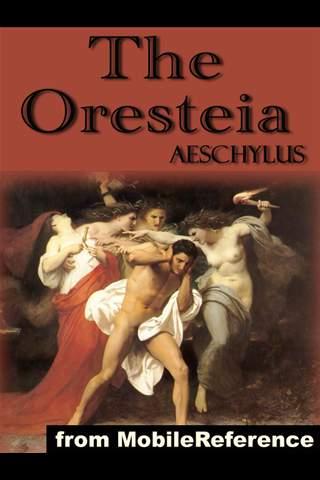"The Oresteia" by Aeschylus 
Литературный анализ трагедии Эсхилла "Орестея"
"The
Oresteian Trilogy” is a masterpiece of the prominent Greek writer Aeschylus. He
presented true dramatic characters in his trilogy. Clytemnestra is one of the
brightest characters of "The Oresteian Trilogy”. This character is interpreted
as a tool of a demon of the patrimonial damnation. She says about that herself,
besides she reminds Orestes of the call of the fate when he intends to kill
her. However that does not mean that Clytemnestra is an innocent agent of gods
and has no will of her own. On the contrary all her actions are motivated by
vital and realistic reasons. She hates her husband and her hatred is boundless.
Clytemnestra motivates it by the murder of their daughter by Agamemnon and by
his love affair with Cassandra. These arguments are obviously insincere. Thus,
Agamemnon did not want to murder their daughter and did it only for the sake of
the obedience to the will of gods. Besides love affairs could not be reproached
from the point of view of the laws of the Greek morality of those times. It is
evident that the reason of Clytemnestra’s hatred towards her husband originates
from the other sources. Trying to justify her actions she speaks about
blinding, fairness and gods. She considers the feud to be justice. She feels
the same hatred towards her daughter Electra, who lives in their house as a
servant or even a slave. Clytemnestra will act obsessed by hatred towards her son
Orestes, when she impels Erinyes to chase him. Aeschylus emphasizes that she is
undoubtedly possessed by a demon. But this demon does not influence her from
outside; she behaves like a demon herself, following her own egoistic desires
and passions. Clytemnestra is extremely masterful woman who can be reserved and
reasonable as a man in a dangerous time, as for example in the conflict of the
elders and Aegisthus or before her death. Sometimes her wit and malice make her
cynical. She pretends to be a faithful and loving wife, she flatters Agamemnon
and later calmly describes all the details of his death. Clytemnestra pretends
to be a loving mother when she is told about her son’s death; she is feignedly
sweet with her rival Cassandra whom she desperately hates. The other side of
Clytemnestra’s soul desires to live a quiet life, she even hopes for
conciliation with the demon that lives inside her. Thus, this woman feels human
emotions (modesty, piety) and in the same time inhuman passions (malice,
cruelty and even savageness). Aeschylus portraits Clytemnestra as a
personification of the demon of the patrimonial damnation and feud. This
character is contradictory, because being on guard of the human rights and
moral punishment, this demon carries out this punishment by the same crimes and
bloody means against which it rebels.
The last
part of "The Oresteian Trilogy” depicts the struggle for Orestes among the
gods. Erinyes, "the elder goddesses” conflict with "the younger gods” Athene
and Apollo. Aeschylus denies the Delphic variant of the myth, according to
which Apollo "purified” Orestes and thus rescued him. The intercession of
Apollo is insufficient. The first part of the tragedy depicts Erinyes who
threaten Orestes in the Delphiс
sanctuary. Then the action takes place in Athens. While Erinyes being the
personification of the patrimonial principle of the feud claim that the
murderer should be punished for his deed, Athene, the patroness of the
democratic statehood considers that it is necessary to give the criminal a fair
trial. Athene establishes the jury trial. She is the president of the court,
besides the best Athenian citizens are among the jury. Erinyes accuse Orestes,
Apollo speaks in Orestes’ support. The judicial contest is presented by
Aeschylus as a struggle between the principals of the fraternal and maternal
rights. According to the beliefs of Erinyes, the murder of a person can be
expiated even if this person happens to be the husband of the woman who killed
him; there is no blood relation between them. The goal of Erinyes is to pursue
those who kill blood kin. Apollo contradicts them and emphasizes the sanctity
of the marriage bonds. The jury cannot pass a verdict; Athene votes for the
justification of Orestes. So he is discharged. There is a cult originated in
Athens in honor of Erinyes. The ancient goddesses of the maternal right will be
honored from now on as Eumenides, the gracious goddesses, the bearers of
fertility. The idea of Aeschylus was to show that the fraternal right gained
victory over the maternal one; the goddesses of the younger generation gained
victory over Erinyes. Besides the feud is abolished after the establishment of
the court. Aeschylus emphasized that the progressive principles triumphed, so
the last part of the trilogy, alongside with the whole "Oresteian Trilogy” ends
in glorification of Athens and
triumphant shouts. So according to Aeschylus the human justice is the
reflection of the celestial justice. Every person should remember that every
evil deed is not left without retribution.
|  Главная
Главная  Наши работы
Наши работы Мой профиль
Мой профиль Регистрация
Регистрация Выход
Выход Вход
Вход